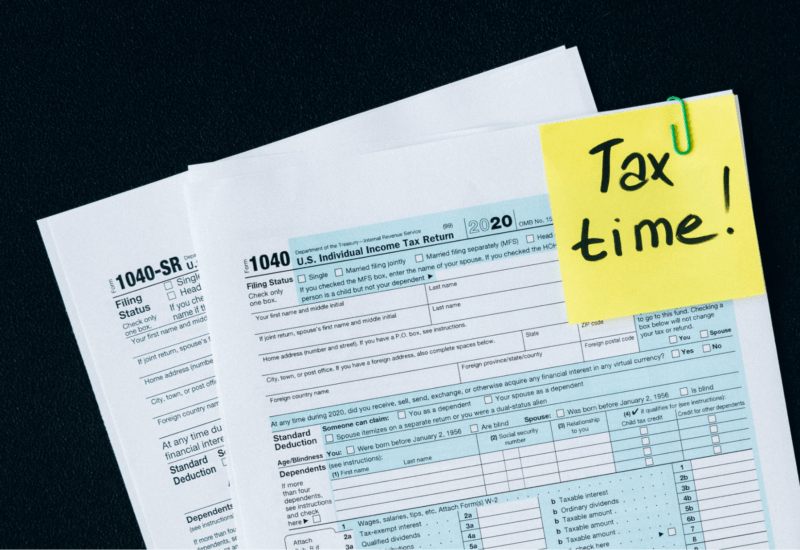Start Building Your Child’s Credit
While teens’ participation in the workforce has been decreasing since the 1970s, millions of children generate an independent income. This begs an important question—do minors have to pay taxes?
The U.S. taxation system can be confusing even without adding age requirements to the equation, so this article sheds light on a child’s tax responsibilities. You’ll learn if your child’s income is taxable and whether they have to file returns independently.
Do Minors Pay Taxes?
The vast majority of U.S. citizens are obligated to pay taxes, regardless of their age. This means your child might have to file a return despite being a minor. Instead of their age, tax liability is defined by the type and amount of income they earn.
There are two types of income your child can generate—earned and unearned. Both types have specific thresholds over which the child has to pay taxes, as explained in the following table:
| Income Type | What It Is | Tax Threshold |
| Earned income | Wages, salary, tips, and other income sources involving performed work | $13,850 |
| Unearned income | Interest, royalties, capital gains, and similar income generated from investments | $1,250 |
Note that the above thresholds apply to the 2023 tax year and are subject to change. You can consult the IRS to determine the tax liability applicable to the current year.
If your child earns both types of income, they must file a return if the gross amount is:
- Over $1,250
- Higher than earned income plus $400
If your child’s earnings are below the above thresholds, it doesn’t mean they’re tax-exempt—it only means they might not have to file a return separately.
Do I Add My Child’s Income to My Tax Return?

Source: Kelly Sikkema
Until your child’s income exceeds the aforementioned limitations, you can add it to your tax return if the child is a dependent. There are four conditions a child must meet to be considered one:
- Being younger than 19 (24 if they’re a full-time student)
- Living with the parent or legal guardian who adds them to their return for over 50% of the given year
- Being responsible for less than half of their financial support
- Not being married
A child can be the dependent of any qualifying relative if they meet the above criteria. They can also be claimed as a dependent if they’re older than 24 but permanently and totally disabled.
Dependents can file separate returns but aren’t obligated to do so until any of the criteria is no longer met. Your child might still want to do it independently in some situations, though. For instance, they can claim refunds for any taxes withheld from their paychecks, which would require a separate return.
Do Minors Pay Social Security Tax?
Besides typical earned income obtained from an employer, your child might make money from freelancing or pocket-money gigs. In this case, they would be considered self-employed and must pay taxes regardless of being a minor.
As there’s no employer to pay their Medicare and Social Security FICA taxes, this burden would fall on the child. Their income would be taxable if they make over $400 within a tax year, and they have to file a return even as a dependent.
Nontaxable Income for Children
There are numerous types of nontaxable income, most notably:
- Gifts
- Inheritances
- Scholarships
- Welfare payments
- Child support payments
Many parents take advantage of nontaxable income to help children enjoy more financial stability later on. This is typically done through custodial accounts, which let parents gift money and various investment assets to the child. As gifts aren’t taxable, the child has a source of income that won’t carry any obligations.
An important point you should remember is that any income earned through a gift is taxable. This is known as the “kiddie tax,” and it was introduced to prevent tax evasion through gifts and transfers to minors.
How Kiddie Tax Works

Source: Mikhail Nilov
Kiddie tax applies to unearned income and is crucial to understand if you open custodial or other restricted accounts to invest in your child’s future.
Let’s assume your child inherits an apartment and decides to rent it out. The apartment itself isn’t taxable, but all money made through rent is considered unearned income and is subject to the appropriate tax.
Your child wouldn’t pay taxes for the first $1,250 of unearned income, and the rest would be taxed as follows:
- Under $2,500—taxed at the child’s rate
- Over $2,500—taxed at the parent’s rate
Rates are determined by income and change each year to account for inflation. The following table breaks down the rates for 2023 according to the latest information from the IRS:
| Taxable Income | Tax Rate |
| Up to $11,000 | 10% |
| $11,001–$44,725 | 12% |
| $44,726–$95,375 | 22% |
| $95,376–$182,100 | 24% |
| $182,101–$231,250 | 32% |
| $231,251–$578,125 | 35% |
| Over $578,125 | 37% |
Other Ways To Support Your Child’s Financial Wellbeing

Source: Scott Graham
Taxes are unavoidable and can be quite cumbersome. The best thing you can do is educate your child on the taxation system and ensure their returns are in order. To directly contribute to their future financial situation, you can use custodial accounts and build some wealth for your child.
There are other ways to minimize the stress on your child’s budget, such as helping them build a strong credit profile. Besides making loans easier to obtain, it can save them over $200,000 throughout adulthood.
The Best Way To Help Your Child Build a Credit Profile
The sooner your child starts their credit profile, the more time they’ll have to maximize their score and enjoy the many perks of good credit. The problem is, teens and young adults often struggle to obtain financial products that help them establish a credit profile early in life, because of the CARD Act of 2009.
This is where parents sometimes jump in by adding children as authorized users of their credit cards. So far, this has been among the most popular ways to build credit for minors and other children who aren’t eligible for independent credit products.
Still, authorizing a child to use your credit card is risky and ineffective for several reasons:
- You need to give the child access to your credit card and may not be able to set a limit, which can lead to excessive debt
- The child will inherit your credit history, so their profile might have red flags from the beginning if you’ve defaulted on your loans in the past
- Your child stops building credit as soon as you remove them from the card, and all your credit history associated with it gets deleted from their profile
To help parents build their children’s credit profiles without these limitations, Austin Capital Bank created a safe and convenient product—FreeKick.
Go Beyond Financial Education With FreeKick
While it’s important to provide your child with a financial education, you also need to take solid steps to give them a bright financial future, such as building their credit profile and protecting their identity. FreeKick by Austin Capital Bank is an FDIC-insured deposit account that offers both of these services.
FreeKick’s Credit Building Service
All children aged 13 to 25 can benefit from FreeKick’s credit building service. To reap its advantages for your child, take the following steps:
- Create an Account—Sign up on FreeKick.bank and choose a deposit that suits your budget
- Set It and Forget It—FreeKick will start building 12 months’ worth of credit history for your children
- Keep Growing—After 12 months, either close the account without any fees or continue building credit for your child for another year
With these simple steps, your child can have up to five years of credit history once they turn 18. This will help them save $200,000 during their lifetimes as they’ll be able to secure loans on favorable terms.
FreeKick’s Identity Protection Service
Credit building is incomplete without identity protection. Child identity theft occurs every 30 seconds, and if your children fall victim to it, their credit profiles can suffer significant damage. This is why it’s a good idea to invest in FreeKick’s identity protection service, which offers the following features for minors:
- Credit profile monitoring
- Social Security number (SSN) monitoring
- Dark web monitoring for children’s personal information
- Up to $1 million identity theft insurance
- Full-service white-glove concierge credit restoration
- Sex offender monitoring—based on sponsor parent’s address
FreeKick also offers identity protection for adult children and parents via the following features:
- Credit profile monitoring
- SSN monitoring
- Dark web monitoring for personal information
- Up to $1 million identity theft insurance
- Full-service white-glove concierge credit restoration
- Lost wallet protection
- Court records monitoring
- Change of address monitoring
- Non-credit (Payday) loan monitoring
- Free FICO® Score monthly
- FICO® Score factors
- Experian credit report monthly
FreeKick Pricing
FreeKick has two pricing plans:
| FDIC-Insured Deposit | Annual Fee |
| $3,000 | $0 (Free) |
| No deposit | $149 |
With both plans, you get:
- Credit building for six children aged 13 to 25
- Identity protection for two parents and six children aged 0 to 25
Secure your child’s financial future through good credit and a protected identity—sign up for FreeKick today.
Featured image source: Nataliya Vaitkevich

Freekick provides a double dose of financial empowerment and security for your whole family. It helps teens and young adults build strong credit profiles and offers identity motoring for up to two adult parents and six children under 25.





